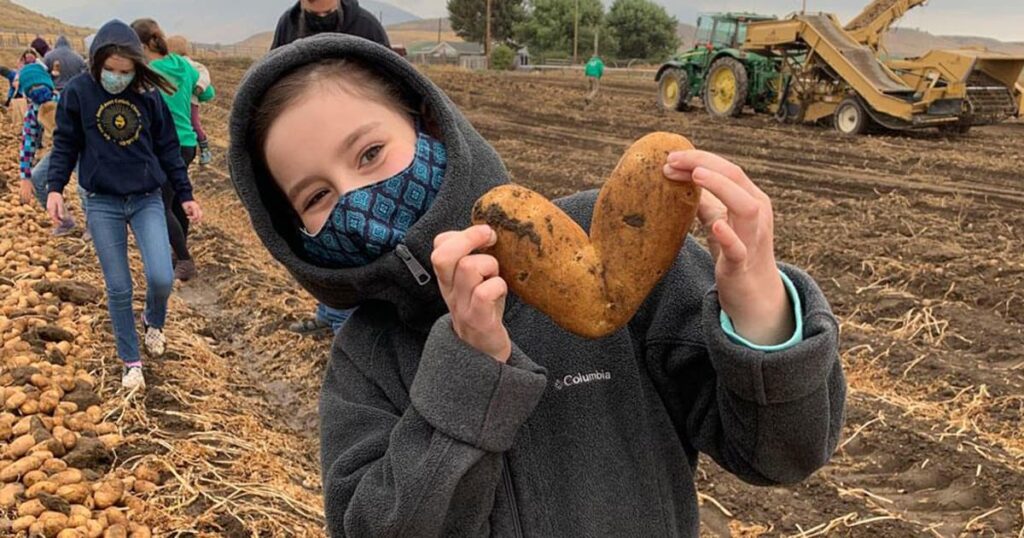
By Chris Branam
Farm to School and School Garden programs across Oregon bring nutritious food to children, teaching them how to grow it and exposing them to the sources of their food.
Key aspects of the program are field trips to local farms and working side by side in school gardens to produce fresh fruit and vegetables. But what happens when those school-based approaches are disrupted by an unprecedented pandemic?
In 2020, Oregon State University Extension Farm to School and School Garden educators in two counties — one in southern Oregon and the other on the coast – came up with creative alternatives to face-to-face experiences.
In Klamath County, Extension faculty and staff from multiple programs came together in the spring to match virtual learning activities with 75 “Grow and Cook” take-home kits that were distributed to families in the Klamath Falls School District. District teachers used a Farm to School and Nutrition Education website to conduct virtual lessons related to the kits.
Then, in the spring, 60 youth from the second through sixth grades formed a 4-H Club that aligned weekly virtual meetings with kits, the website and/or in-person field trips with physical distancing protocols. The club, calling itself “Grow It, Cook It, Like It,” morphed into a summer camp, meeting virtually on Tuesday and Thursday mornings.
On Saturday mornings they met at a farm, market or garden for tours and related hands-on activities and provided kits to practice growing and cooking food at home. The camp re-formed as a 4-H club in the fall, calling itself “Little Sprouts.”
In the summer and fall, Klamath Extension collaborated with food distribution sites to deliver education and provide experiential activities. For example, Extension gave out Farm to School newsletters and Extension Food Hero recipes for the sites to share with their clients.
That wasn’t all. Extension brought in partners from the Klamath County Library and school district to deliver meals, distribute produce with 800 Grow and Cook kits at the library’s rural branches. Finally, in October Extension brought diverse partners together to promote healthy, local produce during the annual “Crunch at Once” event highlighting National Farm to School Month.
“There are lots of branches to what we did,” says Patty Case, professor and Extension faculty in the Family and Community Health Program in OSU’s College of Public Health and Human Sciences. “Our main emphasis continued to be connecting kids with how to grow food and how to prepare it, and where our food comes from.”
Initially, Patty and her colleagues wondered if they could connect with youth through virtual experiences such as Zoom meetings. But they were pleasantly surprised.
“I had my doubts, but the kids made comments that they loved their teachers, and that it was a lot of fun and that they actually made friends,” Patty says. “I didn’t think any of these would be possible when we started. In a lot of ways, a crisis is a time for innovation. What do you have to lose? We kind of learned together, and I loved that approach. I think we’re at a much more confident place.”
In 2020, Klamath and Lincoln counties were awarded Oregon Farm to School and School Garden grants from the state Department of Education. They were among 15 programs statewide in which Extension is a partner.
Family Party with Flavor
Extension faculty and staff in Lincoln County on the central Oregon Coast were invited to participate in the virtual Olalla Center Cultural Festival on Dec. 12. Several staff members worked with the City of Newport to produce a 30-minute, culturally relevant nutrition education video called Fiesta Familiar con Sabor! (Family Party with Flavor).
The video, which alternates between Spanish and English, centers on growing and cooking with celery – in this instance, celery as an ingredient in a Food Hero recipe called Mix and Match Skillet. The video also features Sarah Gibson of the Lincoln County School Garden Program at the Yaquina View Elementary School Garden.
In addition to the video, the Lincoln County Farm to School team, which includes Extension, the Lincoln County School District, and community partners, put together 300 take-home bags for second-graders at four elementary schools. The bags had all of the ingredients and materials required for Mix and Match Skillet recipe.
“It really was a fantastic partnership at so many levels,” says Renée Johnson, education program assistant for Extension’s Master Gardeners, Small Farms and Forestry and Natural Resources programs in Lincoln County. “We have been all working together to make a more equitable community in terms of access to information, and this was a fun event.”
“In our pivoting from face-to-face programming, one of the things that became apparent really quickly was sending take-home hits,” Renée says. “We waited for an opportunity for when it made sense to send something home. Our county’s kindergarten through second-grade students were in school, so they could get the kits at school. We wanted to highlight a food item that grows locally.”
In addition to the send-home kits, Gibson created a Facebook page, Instagram page and a YouTube channel with DIY videos and a virtual field trip to Gibson Farms Blueberries.